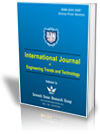A Survey on Cloud Computing Scheduling Algorithms
Citation
Waleed Abd Elkhalik, Ahmad Salah, Ibrahim El-Henawy"A Survey on Cloud Computing Scheduling Algorithms", International Journal of Engineering Trends and Technology (IJETT), V60(1),65-70 June 2018. ISSN:2231-5381. www.ijettjournal.org. published by seventh sense research group
Abstract
Resource allocation in cloud computing is comprised of two main functions: static resource scheduling and dynamic and it also includes subsequent activities like types of resource scheduling, resource scheduling algorithms and their evolution. It displays a vital character in efficient utilization of resources. For any resource scheduling algorithm, the cost, time and energy are most the important QoS parameters. Resource Scheduling Algorithm (RSA) plays an important role in scheduling and execution of most appropriate resources to workloads. It refers to the process of appropriate generation of the schedule that decides which tasks will be mapped on to which resources. In order to ensure QoS to the cloud workload according to the requirements of user. Sometimes RSAs adopt dynamic behaviour whereby resources are scheduled after resource provisioning. Such algorithms are called dynamic RSAs and are considered more efficient than the static resource scheduling. In this paper, we describe all the important resource scheduling approaches that aim at optimizing the user Quality of Service (QoS) metrics such as cost, makespan, reliability, priority and provide cost-effective executions and achieve objectives such as load balancing, availability and reliability in the cloud environment.
Reference
[1] Zhang, Qi, Lu Cheng, and Raouf Boutaba. "Cloud computing: state-of-the-art and research challenges." Journal of internet services and applications 1.1 (2010): 7-18.
[2] Singh, Sukhpal, and Inderveer Chana. "Cloud based development issues: a methodical analysis." International Journal of Cloud Computing and Services Science (IJ-CLOSER) 2.1 (2012): 291-302.
[3] Singh, Sukhpal, and Inderveer Chana. "QRSF: QoS-aware resource scheduling framework in cloud computing." The Journal of Supercomputing 71.1 (2015): 241-292.
[4] Manvi, S. S., & Shyam, G. K. (2014). Resource management for Infrastructure as a Service (IaaS) in cloud computing: A survey. Journal of Network and Computer Applications, 41, 424-440.
[5] Varshney, Shweta, and Sarvpal Singh. "A Survey on Resource Scheduling Algorithms in Cloud Computing." International Journal of Applied Engineering Research 13.9 (2018): 6839-6845.
[6] Chana, Inderveer, and Sukhpal Singh. "Quality of service and service level agreements for cloud environments: Issues and challenges." Cloud Computing. Springer, Cham, 2014. 51-72..
[7] Singh, Sukhpal, and Inderveer Chana. "QoS-aware autonomic resource management in cloud computing: a systematic review." ACM Computing Surveys (CSUR) 48.3 (2016): 42.
[8] Singh, Sukhpal, and Inderveer Chana. "Q-aware: Quality of service based cloud resource provisioning." Computers & Electrical Engineering 47 (2015): 138-160.
[9] Singh, Sukhpal, and Inderveer Chana. "A survey on resource scheduling in cloud computing: Issues and challenges." Journal of grid computing 14.2 (2016): 217-264..
[10] Singh, Sukhpal, and Inderveer Chana. "Cloud resource provisioning: survey, status and future research directions." Knowledge and Information Systems 49.3 (2016): 1005-1069.
[11] Chen, Huankai, et al. "User-priority guided Min-Min scheduling algorithm for load balancing in cloud computing." Parallel computing technologies (PARCOMPTECH), 2013 national conference on. IEEE, 2013.
[12] Mell, Peter, and Tim Grance. "The NIST definition of cloud computing." (2011).
Keywords
Cloud Computing, Resource management, Resource Scheduling, Need of Scheduling, Makespan, RSAs, QoS



